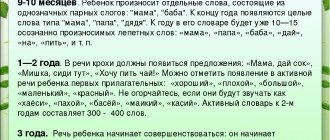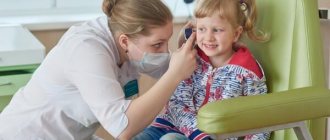The first words of a child are always a great joy for parents. Many mothers are looking forward to this important event, and if their one-year-old child does not say “mom,” they sound the alarm and run to specialists, finding out what time children begin to speak their first words. Doctors and speech therapists reassure parents, explaining that speech develops gradually and the first words appear when the child is ready for it.
A baby's first words are an important milestone in his speech development. The time at which the first words appear depends on how speech developed at the previous stages.
Read children's books
Books for children are interesting not only with rhymes and bedtime stories, but also with illustrations. It is important for them to look at the pictures and at the same time listen to what the adult is reading.
Read with intonation and placement, slowly and melodiously
. Make it look like a real theatrical performance. So the baby will begin to watch you, your pronunciation, and the emotions on your face with interest.
You can describe what is drawn in the book. If these are animals, try to depict how they “talk”: the cat “meow-meow”, the dog “woof-woof”, the cow “moo-moo”. Onomatopoeia is quickly remembered. Use it in everyday life: we eat “yum-yum”, drive a car “beep-beep”, stomp our feet “top-to-top”.
Basic Rules
Both mother and father eagerly wait for the baby to say his first word. But there is no need to rush. Don't expect instant results. It takes time to develop a new skill—speech. Therefore, the first thing parents need is patience.
The second rule is the formation of passive vocabulary. Many people believe that a baby who cannot speak does not understand speech addressed to him. It is a myth. The baby’s memory records everything that happens around him, including the speech of his parents. Train yourself to comment on everything you do:
- Let's eat now;
- getting dressed for a walk;
- go to bed;
- Let's go swimming.
This helps to accumulate a passive vocabulary. The baby will easily remember words and phrases that are repeated daily and will repeat them over time.
It is important to talk to your child as if you were an adult. There is no need to lisp or copy children's pronunciation. Otherwise, the child will have problems with articulation.
When parents call objects or people in a diminutive form - mommy, daddy, kitty, dog, granny, etc., this will lead to confusion. The baby will have to rebuild his speech. Therefore, try to talk to him as you would to your friends.
The third rule is to develop fine motor skills. The development of speech directly depends on the dexterity of the fingers. Therefore, offer your baby toys related to the development of motor activity of the hands - pyramids, large puzzles, construction sets and mosaics. And playing games together with mom and dad will bring the baby a lot of positive emotions.
The fourth rule is lullabies. A mother is irreplaceable for a baby in the first year of life, and her voice is the most familiar. A lullaby not only calms the baby and helps him fall asleep, but is also a way of communication. Children quickly get used to their mother's songs, memorizing the words. It also helps build vocabulary.
The fifth rule is repetition and memorization. The baby does not perceive long speech structures well, and will not be able to reproduce them. But the simple words and short phrases that his mother addresses to him every day are quickly remembered. Hearing the same words every day, the baby will soon try to reproduce them. The main thing is to talk to your child more often and be patient.
Rule six - repeat the sounds. The baby likes it when his mother repeats the sounds he makes. This is a reason for joy and a good workout for the child’s articulatory apparatus.
Repeating after the baby, change one sound. For example, when he says “lluu,” say “llaa.” And the baby will try to repeat what he heard. This way, a simple game will turn into a full-fledged speech therapy session.
Rule seven – we learn by playing. Play is the main activity of a child. Therefore, try to make games not only fun, but also useful. It’s fun to play with the little ones, covering their faces with their palms and asking: “Where did mom hide?”
Rule eight and most importantly - more praise. Everyone loves to be praised. And the baby is no exception. Rejoice with your child when he manages to say a new syllable. This motivates the baby to new achievements. Try to clearly express your emotions - clap your hands, smile. Mom’s delight is a great reason to start talking as early as possible.
How to teach a child to say the letter Sh
Another “problematic” sound among children is “Sh”. It is important to start learning as early as possible so as not to miss the moment and correct the pronunciation in time. We start with articulation gymnastics.
- "At the dentist." The child opens his mouth as wide as possible and fixes the position for 15 seconds. Repeat 10 times. The exercise strengthens the lower jaw.
- "Fence". We smile and place the upper jaw on top of the lower jaw. We fix it for 20 seconds, trying to relax the facial muscles.
- "Smile". Having closed our teeth, we try to stretch our lips into a smile for 5-10 seconds, repeat 10 times.
- "Proboscis". We stretch our lips into a tube as far as possible. Repeat 10-15 times
After warming up, we begin language learning:
- "Horse". We press our tongue to the roof of our mouth and clack, imitating a horse.
- “Clock”. Turning left - right, repeat “Tick-Tock”
- “Toad” We move the tongue forward and backward.
- Create your own word game with hissing sounds.
- Communicate with your baby without “lisping” and using correct pronunciation.
Speech development techniques
- Conversation between mother and child. The mother spends a lot of time with the baby. Tactile and verbal conversation is important to him. It is necessary to hum to the baby so that he can see mommy’s face and articulation.
- Comment on your actions. Tell your baby everything you do.
- Talk to your child so that he can see your face and your articulation.
- At the age of 1.5 - 2 years, the mother should conduct a conversation with the baby in the usual rhythm and tone. Only when it comes to new words, special attention is paid to articulation and stress.
- Don't replace complex words with simple ones. Call a spade a spade.
- Don't forget about verbs.
- Use contrast. For example: a bird flies - a dog runs
- Read poems, nursery rhymes, fairy tales from the very beginning.
- Play with words, syllables, sounds.
- It is important to improve the development of fine motor skills of the hands. Let your baby play with cereals, pasta, and dough. Children with well-developed fine motor skills are able to think logically, they are attentive, and they begin to talk and write faster.
Signs of delay in speech development
Parents and kindergarten teachers should clearly know the signs of deviations in the development of speech function. This will help to identify violations in time and help the child. Signs of deviations are prescribed for each age, which is explained by the rapid development of the baby up to 2-3 years of age.
Signs of violations:
- At one month of age, the baby does not cry on the eve of feeding.
- At 4 months of age, the baby cannot smile or walk.
- At 5 months, he does not look for people or objects that his mother names while holding him in her arms, and does not listen to music.
- At 7 months of age, the child does not recognize relatives, cannot respond adequately to intonations, and does not play with rattles or musical toys.
- By the age of 9 months he does not babble, does not repeat syllables and words after relatives.
- By 10 months of age, the child does not shake his head in denial or wave his hand when someone leaves.
- By the age of one year, he does not speak or babble at all, and does not perform simple tasks.
- At 1 year 4 months. uses the words “mom” and “dad” inappropriately.
- At 1 year 9 months. The baby does not say 6 meaningful words.
- By the age of 2, the child does not show parts of the body (arms, legs, head, nose, eyes, fingers), and is not able to complete complex tasks: “Go to the room, bring a toy.”
- By the age of 2.5 years, the baby does not understand the difference between a small and a large object.
Formation of speech function in children 1-2 years of age
At what time does a child begin to speak his first words? The baby's development occurs gradually. At first there is practically no hint of speech until 2 months. By the age of 3-4 weeks, the baby begins to smile for the first time, thereby showing a desire to communicate with his parents. The baby perfectly understands the intonation of adults, so when he hears the friendly voice of his mother, grandmother or father, he feels calm. If adults begin to swear, the baby becomes very worried, which often leads to sleepless nights and causeless crying.
Crying is a sign that something is bothering the child. The baby may cry when he needs to change his diaper, wants to eat, or is in pain. Also, shouting is a sign of a call for communication. The baby calls on his mother to just stand next to him, take him in her arms, and talk to him.
The first signs of speech appear only at 2-3 months. The baby starts to walk. Humming may occur earlier than 2 months, depending on the characteristics of the brain. It is a sign of preparation for speech. The muscles of the articulatory apparatus are trained and strengthened. This stage continues for a long time.
The next stage of development is the formation of babble. It starts at 7-9 months. The baby tries to speak in syllables: ma-ma-ma, ba-ba-ba and others. Syllables later form words. The reproduction of syllables is often not connected with anything. The child says them unconsciously.
Infants aged 9-11 months perfectly understand the speech of adults. They know 50-100 words by ear. When the baby hears the words of an adult, she tries to repeat them.
What are the first words children say most often?
“Honey, he said his first word!”
Well, this is an important milestone in the initial life journey of a new member of society. With what trepidation parents await the first words of their children! An exciting moment.
But is it really important what word the baby says first? “Mom”, “dad”, “grandmother” or “grandfather”? If he names this or that word or sound, sound complex, imitation... does this mean that he is extremely interested in someone (something), loves or shows such sympathy? We tried to find out and we can say: yes and no.
Since pronouncing words is a complex process, in anticipation of which the baby will have to practice a lot, develop a speech apparatus, realize the need to pronounce, combine different words and sounds, and so on and so forth.
see also
25 Kids Who Sent Very Funny Messages to Their Parents
How to teach a child to say the letter P: speech therapy exercises
For children, the sound “r” is the most difficult to pronounce. Most parents are concerned with the question of how to teach their baby to say the letter “R”.
As defectologists say, the favorable age for mastering the sound “r” is five to six years. It is at this age that the intervention of a specialist can help the child speak correctly.
Although the foundation needs to be laid from the very beginning. For this purpose, a set of exercises has been developed in a playful way for the little ones:
- Learn a few tongue twisters with your child that train the sound “r” or come up with your own together with your child
- Ask your baby to imitate the sounds of animals, such as a tiger.
- Many children love the “cat” exercise. Pour milk into a bowl and ask your baby to drink it, like a cat does.
Articulation gymnastics for little ones
It is very useful to give your baby a massage before gymnastics. The baby should be in a good mood and healthy. The recommended exercise time is the same and lasts no more than 15 minutes. Any mother knows her child and can create gymnastics in an interesting way.
- Balloon. We show the baby how to inflate a balloon, while inflating his cheeks. This way we massage the face.
- Locomotive. We teach the child to distinguish sounds. How does a train make? That's right. Fold the sponges into a duck shape, making circular turns left and right at the same time. Time, one minute per side.
- Smile. First we smile, and then we put our lips into a tube, two minutes.
- Kiss. We kiss and press our lips together. We practice for two minutes.
- Little horse. You need to make a similar sound when stopping a horse - tfpr-tfpr. We do it as continuously as possible. This exercise helps to develop your lips.
- Mouth - sponges. Use your tongue to sweep across your lips in both directions.
- Language. Consistently touch the upper and lower lips. Next to the corners of the left and right sides of the mouth.
- Morning wash. We imitate washing the face, stroke the face and neck with both hands, rub from the forehead, along the maxillary sinuses, to the neck.
- We finish the gymnastics by repeating vowels and consonants.
Speech therapists, for the formation of the articulatory apparatus, recommend reading the book “Fun Articulation Gymnastics” with your child, N.V. Nishcheva. The book is suitable for little ones too.
By repeating sounds after animals and imitating movements, looking at bright pictures, such gymnastics can be done easily and naturally. And the beautiful mirror included is a pleasant surprise for the kids, because they love to look in it.
Another very cool book for children from six months is “Lessons of a Speech Therapist” by E.N. Kosinova. The contents of the book are simply fascinating. It presents a whole collection of finger games, language gymnastics in the form of games (funny stories about the languages of the world), tongue twisters for children aged 3 years and older. The book is very bright.
Recommendations for parents with speech pathology
Deviations can be noticed by kindergarten teachers, parents or a pediatrician. It is very important for parents to observe the child themselves and read more books about the development of preschoolers. The main principle in diagnosis is regular visits to the pediatrician. During the first year, you should go to the pediatrician every month. In the second year of life, the child is brought to the doctor once a quarter. The pediatrician will definitely see the pathology and tell the parents about it.
If there is a delay in speech development, you should contact a neurologist and speech therapist. Specialists will refer you for an examination to identify the cause of the disease. The speech therapist will conduct a speech therapy examination, begin classes, and give recommendations to parents on working with their preschooler at home.
The earlier disorders of speech and general development are identified, the easier it is to eliminate the pathology.
Consultation with a speech therapist is required for healthy children from the age of 3, and then annually until the age of 7. If deviations are detected earlier, specialist help is indicated before the age of 3.
How to teach a child to say the letter L
Violation of the pronunciation of the sound “L” in defectology is called Lambdacism. Very often children do not pronounce this letter because they do not hear it in a word. To teach a child to pronounce the letter “L”, you need to show him the words where it occurs and it is advisable to show illustrations.
They even out the language pronunciation of nursery rhymes and tongue twisters. And we start the warm-up with speech therapy exercises:
- "Painter". Using the tip of your tongue, smoothly and carefully move it across the upper palate, as if working with a painter’s brush.
- "What's hiding under the tablecloth." We take five objects that have the letter “L” in their designation. Let the child guess the name of the thing by touch.









